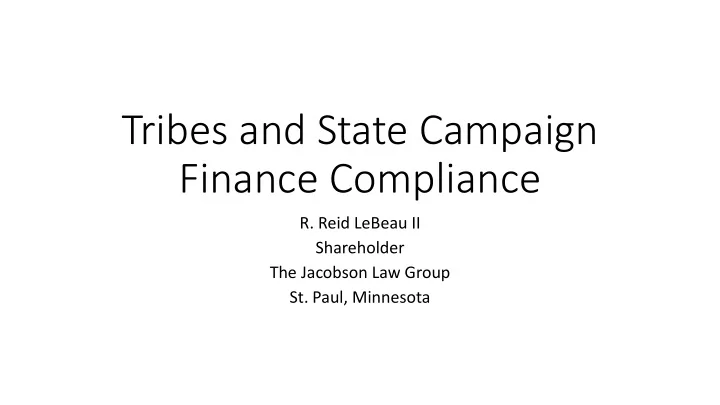

Tribes and State Campaign Finance Compliance R. Reid LeBeau II Shareholder The Jacobson Law Group St. Paul, Minnesota
Tribal Sovereignty and Political Participation • Political participation is one of the major hallmarks of sovereignty. • The Supreme Court has stated time and again that, for those matters that, for whatever reason, are no longer within the purview of inherent of sovereign authority, the recourse of tribes is not the courts but rather Congress and the political process. • E.g. United States v. Lara , 541 U.S. 193, 199–201 (2004) (overruling Duro v. Reina , 495 U.S. 676 (1990), in lieu of subsequent congressional legislation—the “ Duro fix”—codified at 25 U.S.C. 1301(2)). • This also includes participation at the state and local levels of government.
State Compliance • State campaign finance law can differ from federal election law in significant ways. • State and federal laws differ in the penalties imposed for violations, as well. • Tribes may be subject to additional regulations and filings.
Minnesota Campaign Finance Law • Federal law does not require tribes to form federal political action committees. • Minnesota law alternatively requires tribes to form political committees in order to participate in state elections. • Contributions to Political Committee by Indian Tribe—Indian Tribe Contributions, Op. Minn. C.F.B. No. 290 (July 8, 1998). • Tribes are required to transfer money from their general treasuries into their state PACs and report the transfers. • Until recently 24 reports of the transfer were required
Minnesota Campaign Finance Law • Minnesota’s definition of a corporate contribution, under Minn. Stat. § 211B.13 (2018), differs widely from federal law. • “Anything of value” given by a corporate entity is a “contribution” • There is no state corollary to the federal law, 52 U.S.C. § 30101(8)(B) (2012), that exempts administrative services from the definition of a “contribution.” • SSF’s are illegal under Minnesota law • SSF’s may NOT contribute to MN state political committees. Contributions from Unregistered Associations, Op. Minn. C.F.B. No. 447 (June 6, 2018).
Tribal Participation and Citizens United • Not until Citizens United was a corporation able to participate in state elections. • This also provides an opportunity for tribal corporate interests to participate in elections outside of what is in the general treasury.
Similarities between federal and state law • One similarity between federal and state law is that Tribes have no limit on the overall amount they may donate to candidates in aggregate. Under FECA, an “individual” is subject to both the limits on how much a “person” can contribute to a candidate, party, or PAC, and also to an additional limit on how much they can give in aggregate to all candidates, parties, and PACs in a two-year election cycle. 2 U.S.C. 441a(a)(3). FECA does not specifically define the term “individual.” In 2000, the FEC issued an advisory opinion stating that tribes, although “persons” under the FECA, are not “individuals” subject to aggregate contribution limits. Oneida Nation of New York, Op. F.E.C. No. 2000-5 (May 15, 2000). • Additionally, it may be difficult (if not impossible) for some state PAC’s to give to a federal committee, as Minnesota has no limit on what a political committee may accept from a contributor. • This means that Minnesota
Penalties • Violation of the corporate contribution statute in Minnesota is a felony. Minn. Stat. § 211B.15 (2018). • Violations are prosecuted by the county and are subject to discretion of each of the 87 county attorneys. Minn. Stat. § 211B.16, subd. 3 (2018).
What does all this mean • In Minnesota tribes must form a PAC. • If Tribes want to participate in federal elections, they do not need to form a PAC, but likely cannot use the state PAC for federal purposes. • Citizens United may provide a new avenue for participation.
Recommend
More recommend